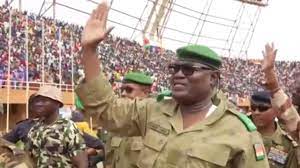
One week after a deadline passed for mutinous soldiers in Niger to reinstate the country’s ousted president or face military intervention, the junta has not acquiesced. No military action has been taken and the coup leaders appear to have gained the upper hand over the regional group that issued the threat, analysts say.
The West African regional bloc ECOWAS had given the soldiers that overthrew Niger’s democratically elected President Mohamed Bazoum until last Sunday to release and reinstate him or they threatened military action. On Thursday, the bloc ordered the deployment of a “standby” force to restore constitutional rule in Niger, with Nigeria, Benin, Senegal and Ivory Coast saying they would contribute troops. But it’s unclear when, how or if the troops will deploy. The move could take weeks or months to set into motion, and while the bloc decides what to do the junta is gaining power, some say.
“It looks the putschists have won and will stay … The putschists are holding all the cards and have cemented their rule,” said Ulf Laessing, head of the Sahel program at the Konrad Adenauer Foundation. ECOWAS is unlikely to intervene militarily and risk dragging Niger into civil war, he said, adding that ECOWAS and Western countries would instead likely press the junta to agree to a short transition period. Europe and the United States will have little choice but to recognize the junta in order to continue the security cooperation in the region, Laessing said.
The July 26 coup is seen as a major blow to many Western nations, which saw Niger as one of the last partners in the conflict-riddled Sahel region south of the Sahara Desert that they could work with to beat back a growing jihadi insurgency linked to al-Qaida and the Islamic State group.
The US and France have more than 2,500 military personnel in the region and together with other European countries have invested hundreds of millions of dollars in military assistance and training Niger’s forces. There was still little clarity about what would happen days after ECOWAS announced the “standby” force deployment.
A meeting of the region’s defense chiefs was postponed indefinitely. The African Union is expected to hold a meeting on Monday to discuss Niger’s crisis. The delay of the defense chiefs’ meeting to discuss the “standby” force shows that ECOWAS views the use of force as a last resort, said Nate Allen, an associate professor at the Africa Centre for Strategic Studies.
“Given the likely challenges an intervention would face, (the use of force would) require a high degree of consensus and coordination not just within ECOWAS, but within the African Union and international community writ large,” he said.
POLITICAL HISTORY OF NIGER COUP